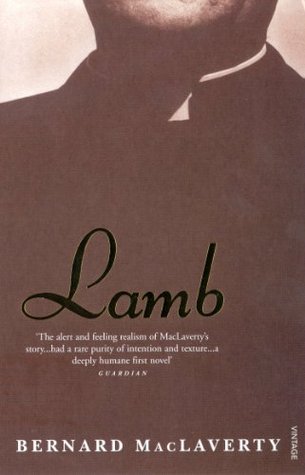Lamb, by Bernard MacLaverty, is, at 150 pages, a short read, but its brevity serves only to provide a perfectly told story without padding or exposition. It follows the story of a young priest, Michael Lamb (or Brother Sebastian), who runs away from the Irish Borstal that he works in, takes a deprived boy named Owen Kane with him. But, as his money dwindles, news of the kidnapping closes in on them, and Lamb finds himself running out of ideas on how to save the boy’s life, leading to a dark climax borne of both necessity and love.
Beginning in the Borstal, aptly referred as “a finishing school for the sons of the Idle Poor” by its head, Brother Benedict, Lamb observes this to be an accurate statement as he believes it finishes their lives, providing them with little hope for the future. Upon inheriting money from his father’s death Lamb resolves to rescue Owen, a misunderstood – and epileptic – boy, often made an example of due his stubborn nature, and give him the life he deserves. They break for London, and spend their time exploring the city and discovering each other, until the time comes when they have so few options that Lamb is required to make the decision that will affect their lives, but he believes to be right.
The characters, throughout, are developed sufficiently to create your own impression of them; although Owen’s character could have done with further expansion with regards to his life before Borstal. Lamb, especially, as you would expect a title character, is well conceived and his decisions, at all times, appear believable. Brother Benedict, a sadist at heart, claims that he “was belted black and blue myself what harm did it do me?” without realising that it turned him into the one now administering beatings. Even the fringe characters: conmen, housekeepers, and perverts have enough splashes of colour to make them plausible.
The writing, while not being flowery, is engaging enough to spin the narrative on, making it a book you are not likely to put down until completion. It’s a thrill to read as the escapes bond with each other, but watching as their world of opportunity caves in around them. The underlying meanings and symbols that make the book special, the many inferences of the book’s title, for example, raise the scope of the novel, adding further richness to it.
Lamb, for its length, covers a number of topics, but the theme that stands out, for me, is love; that, and the things you would do for it. Sometimes, you don’t even know you are doing it, Lamb discovers while trying to understand the fugues of Owen’s epilepsy. But it’s the grim denouement of the novel that questions how far one would really go, and it’s this that adds the pièce de résistance to a wonderful and haunting tale.
